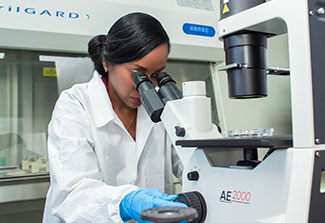NCI grantee addresses inequities in prostate cancer
November/ December 2021 | Volume 20 Number 6
By Mariah Felipe
 Photo courtesy of University of the West IndiesJamaican scientist Dr. Simone Badal is using an NIH grant to develop prostate cancer cell lines from Black men of Caribbean ancestry, after finding there were none in existing banks.
Photo courtesy of University of the West IndiesJamaican scientist Dr. Simone Badal is using an NIH grant to develop prostate cancer cell lines from Black men of Caribbean ancestry, after finding there were none in existing banks.
Although advances in prostate cancer treatment have improved global survival rates overall, that has not been the case for Black men of African and Caribbean descent. In the U.S., this population has the highest incidence of prostate cancer and death rates that are 2.5 times higher than among Caucasians.
While working on her Ph.D. studying natural products that might work against various cancers, Jamaican scientist Dr. Simone Badal made a startling discovery—all of the cell lines used in her research were from White people of European ancestry. When she consulted the literature, she discovered that most cell lines are of European ancestry.
“It got me thinking, would these components be just as effective if I had used Black cell lines?” said Badal, who is a senior lecturer at the University of the West Indies, Mona. When she went to look for cell lines from Black people of Caribbean ancestry, there were none. “That's when I knew we needed to develop our own cell lines.” She then decided to focus on two cancers of concern, prostate and breast.
In Jamaica, many men are averse to undergoing digital rectal exams to screen for prostate cancer, which contributes to the high mortality rate, Badal said. “I do believe genetics plays a significant role as well, because research also shows that if you have two patients, one Black and one White, with similar types and stages of prostate cancer, the White patient is more likely to respond better to the treatment.”
Badal worked with urologists to gather tissue samples from consenting patients with prostate cancer to try to develop prostate cancer cell lines. Her team used several different protocols but for the first few years, none of the cells survived. Eventually, Badal and her team developed a novel methodology that was successful. “I chose to develop cell lines because they are tools that can be used to screen anticancer lead molecules, as well as provide a basis for the molecular drivers of cancer,” Badal noted.
To continue developing new cell lines, and then using them to test both natural products and existing cancer therapies, Badal successfully applied for a
Fogarty Emerging Leader Award. Jointly funded with the National Cancer Institute, the grant has also enabled her to complete advanced training in genomics and bioinformatics—both key to furthering her research.
Badal hopes the attention her novel cell lines have received will add to the growing focus on health disparities research. “As investigators, when we are developing our research, it should be a requirement that cell lines from all different races are represented, especially in drug discovery. That’s an important subject, and while I haven’t seen much discussion in that regard, I do see positive changes in this broader health disparities arena.”
Badal envisions transforming her lab at the University of the West Indies into a cutting-edge research facility, capable of conducting all the sophisticated imaging, genomics analyses and other processes that are required. In addition to saving lives, she hopes her studies on the anti-cancer properties of Jamaica’s indigenous natural products will boost her country’s pharmaceutical industry, which could drive economic growth. Her Ph.D. research identified several promising substances, such as one derived from the plant
Castella macrophylla, which was more potent than the chemotherapy drug Tamoxifen.
Badal and her team are also working to produce breast cancer cell lines for Black women of African and Caribbean ancestry. There is a personal element to the work that inspires her—Badal lost a close friend to breast cancer and her husband’s mother died of the same disease.
“As scientists, we cannot lose our resolve,” said Badal. “We have to use our personal experiences, and use the left and right sides of our brains and just push on.”
More Information
- Related grant:
Novel Prostate Cancer Cell Lines to Address Prostate Cancer Disparity in Black Men
-
The need for cell lines from diverse ethnic backgrounds for prostate cancer research
Nature Reviews Urology via PubMed, September 13, 2019
-
Disparities in prostate cancer incidence and mortality rates: Solvable or not?
The Prostate via PubMed, November 8, 2019
-
The biotechnologists making their mark on the international stage
Profile of five scientists including Dr. Badal,
Nature, May 29, 2019
-
Grantee Spotlight: Simone Badal, Ph.D.
National Cancer Institute Center for Global Health profile, May 27, 2021
To view Adobe PDF files,
download current, free accessible plug-ins from Adobe's website.
Related Fogarty Programs
Related Global Health Research Topics